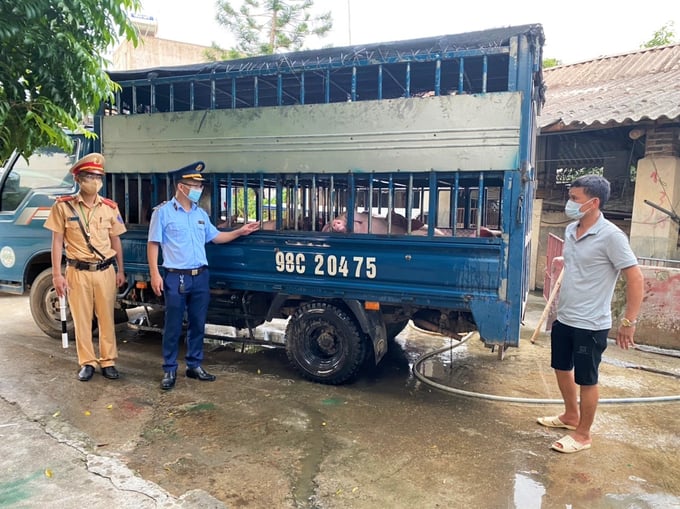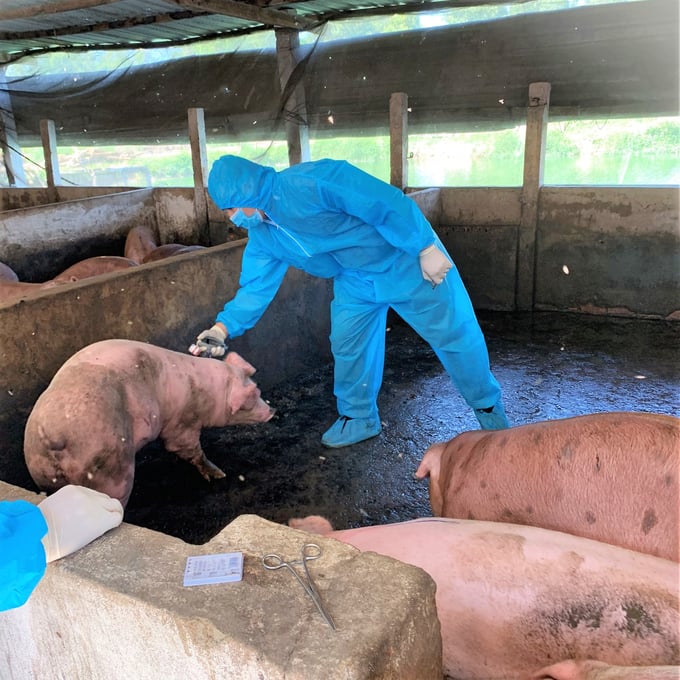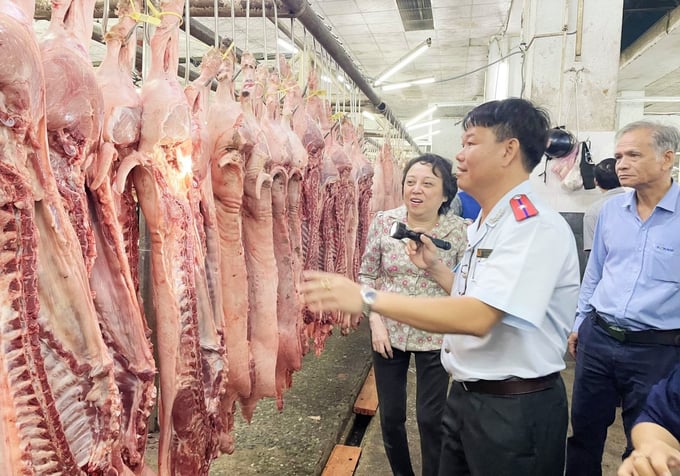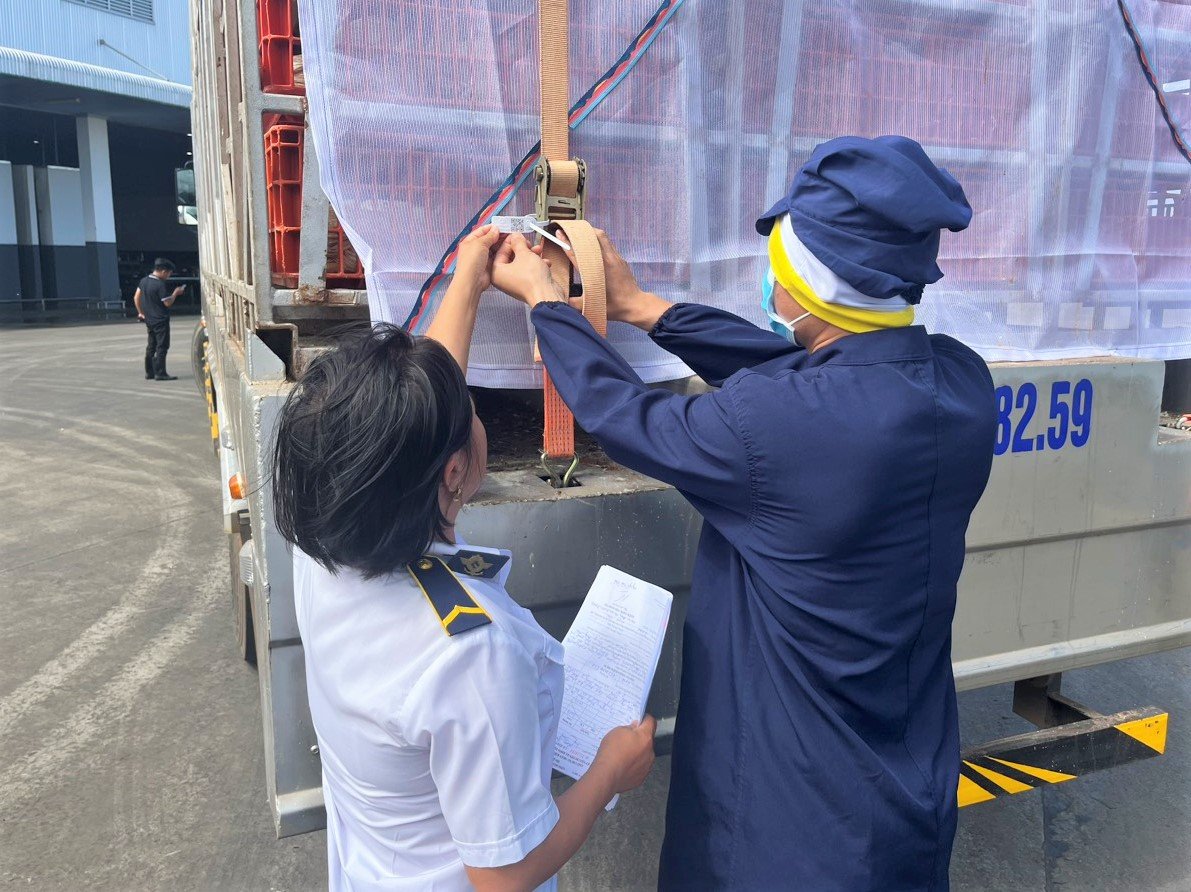June 21, 2025 | 02:22 GMT +7
June 21, 2025 | 02:22 GMT +7
Hotline: 0913.378.918
June 21, 2025 | 02:22 GMT +7
Hotline: 0913.378.918

The Ministry of Agriculture and Rural Development advised local People's Committees to strengthen the management of transport quarantine, control of animal slaughter, and compliance with animal health regulations. Photo: TQ.
The Ministry of Agriculture and Rural Development issued a document on June 6 to request local People's Committees to strengthen the management of transport quarantine, control of animal slaughter, and compliance with animal health regulations.
According to reports from provinces across the country, the management of quarantine, transport and control of animal slaughter faces many difficulties.
Namely, several local governments have failed to bolster the management of the transport and control of animal slaughter. Furthermore, they have not issued a plan to establish an animal slaughtering network in accordance with the Law on Animal Health. There are only 18 provinces and cities in Vietnam that have established a detailed plan by 2023.
There are 463 concentrated slaughterhouses and over 24,000 small-scale slaughterhouses nationwide. The majority of these establishments have not complied with the law on Animal Health. Additionally, their allocation of financial resources for the management of slaughter and food safety is limited.
There is a need for improvement in terms of inspection, examination, handling of violations, and coordination between the animal health sector and relevant agencies. Most importantly, many small-scale and illegal slaughterhouses are still in operation.
The Ministry of Agriculture and Rural Development proposed the Chairmen of local People's Committees to direct relevant agencies in complying with the Law on Animal Health, Decision No. 414/QD-TTg dated March 22, 2021, Directive 02/CT-TTg dated January 14, 2023, and especially the Prime Minister's Official Dispatch No. 426/CD-TTg dated May 18, 2023.
In addition, local governments are recommended to prioritize allocating resources to reinforce the animal health system across all levels. For provinces and cities where district-level specialized animal health stations are merged with other units under the district-level People's Committees, they must urgently strengthen the capacity of their animal health systems in accordance with the 2015 Law on Animal Health.
Accordingly, stakeholders are requested to closely follow the guidance of the Politburo, the Secretariat, the National Assembly, the Government and the Prime Minister on maintaining, consolidating and strengthening the animal health system as prescribed in Article 6 of the Law on Animal Health. Moreover, local governments are urged to re-establish the district-level animal health station under the management of the local Sub-Department of Livestock Production and Animal Health.
Regarding provinces and cities with a stable system of specialized district-level animal health stations, the Ministry of Agriculture and Rural Development advised them to continue maintaining the organizational system as prescribed in Article 6 of the Law on Animal Health; Articles 4 and 5 of the Government's Decree No. 35/2016/ND-CP dated May 15, 2016 clarifying the Law on Animal Health.

The Ministry of Agriculture and Rural Development urged local governments to strengthen their animal health systems at all levels in accordance with the Law on Animal Health . Photo: Trung Quan.
Stakeholders are urged to review and develop a roadmap on the establishment of a concentrated slaughterhouse network in accordance with the Law on Animal Health, the Law on Planning and the Prime Minister's Directive No. 02/CT-TTg dated January 14, 2023.
Additionally, policies to encourage investment in the construction of concentrated slaughterhouses will be further reviewed. Various departments, agencies and sectors need to coordinate with local People's Committees at all levels to develop the roadmap. Responsible agencies must take drastic solutions to integrate small-scale and spontaneous slaughterhouses into concentrated slaughterhouses as well as handle establishments that fail to comply with the regulations on animal health and food safety.
Local governments need to promote the application of modern technology in animal quarantine, management of animals and animal products. Moreover, they are encouraged to develop a slaughter control information system as well as a traceability database for livestock brought to local slaughter.
In terms of financial resources and infrastructure, detailed policies will be adopted to encourage investment in modern hanging livestock slaughtering lines. In addition, there will policies to support and facilitate job change for workers after the closure of manual slaughterhouses.
It is necessary to provide specific solutions for each project in order to increase the capacity of industrial slaughter and ensure that industrial slaughterhouses can operate at 80–100% of their capacity.

Local governments are instructed to strengthen the inspection and examination of animal health and food safety compliance for slaughterhouses. Photo: TQ.
A secondary fund will be allocated to pay the wages of animal health staffs in charge of slaughter control, in case the local budget is insufficient as a result of natural disasters or epidemics. A special framework must be established for animal health staffs contracted to perform slaughter control. Accordingly, their wages and salaries will be paid from fees and charges.
Local Departments of Agriculture and Rural Development have been instructed to develop food safety monitoring programs for animal-based food production chain on an yearly basis. Additionally, local funds will be allocated to implement food safety monitoring programs for meat, livestock and poultry.
Local animal health and food safety inspection activities will be strengthened for salughterhouses. Violations will be strictly handled in accordance with the regulations for concentrated slaughterhouses without certificates of animal health and food safety or small-scale slaughterhouses without business registration certificates.
Local governments must establish a detailed plan to inspect, examine, supervise and handle administrative violations in local slaughterhouses to ensure disease safety, animal health, food safety, and environmental protection.

The Ministry of Agriculture and Rural Development requested local Departments of Animal Health to coordinate, guide, and monitor the implementation of animal quarantine, sanitation and slaughter control. Photo: TQ.
The Ministry of Agriculture and Rural Development has also requested local Departments of Animal Health to organize training courses for officials and civil servants in charge of slaughter control, animal sanitation inspection, and food safety supervision.
Outstanding slaughter management models will replicated in mountainous provinces in order to manage slaughterhouses effectively and guarantee food safety and disease prevention.
Local working groups will be assigned to provinces and cities to coordinate, guide, and monitor the implementation of animal quarantine, sanitation and slaughter control.
The establishment of concentrated slaughterhouses that adhere to standards for animal health, food safety, and environmental protection is encouraged. Accordingly, the management boards of various agricultural projects will research methods of utilizing funds from internationally funded programs and other capital sources to achieve this goal.
The Department of Quality, Processing and Market Development has been requested to encourage businesses to invest in concentrated slaughterhouses and the preliminary processing of animal-based products.
Local governments will assist the Ministry of Agriculture and Rural Development in proposing policies that encourage businesses in the pork and chicken value chain to construct cold and frozen meat salughterhouses. Consequently, these establishments will form a safe farm-to-fork supply chain for domestic and international consumption of animal-based products.
The National Center for Agricultural Extension, in collaboration with local Departments of Animal Health, will organize training courses to improve the quality of animal quarantine and control for various Sub-Departments of Livestock Production and Animal Health.
The Ministry of Agriculture and Rural Development has requested the Department of Animal Health to develop a coordination framework between the government and relevant parties in the management of slaughterhouses. This framework will help parties regularly exchange information regarding transportation management, animal slaughter, food safety for cattle and poultry meat.
Translated by Nguyen Hai Long
![Turning wind and rain into action: [9] Digitizing hydrometeorological data in response to climate change](https://t.ex-cdn.com/nongnghiepmoitruong.vn/608w/files/news/2025/06/17/z6704423696987_15fd32ffc26d590d204d520c9dac6786-nongnghiep-165943.jpg)
(VAN) Farmers have begun accessing hydrometeorological applications to adjust their cropping schedules, aiming to ensure productivity and adapt to climate change.
![Turning wind and rain into action: [8] Real-time salinity detection and early warning technology](https://t.ex-cdn.com/nongnghiepmoitruong.vn/608w/files/news/2025/06/17/z6704423696987_15fd32ffc26d590d204d520c9dac6786-nongnghiep-151127.jpg)
(VAN) Thanks to the integration of modern hydrological-hydraulic models, remote sensing technologies, and artificial intelligence, the accuracy of hydrological forecasting has significantly improved.
![Turning wind and rain into action: [7] Early disaster warnings help marine farmers minimize losses](https://t.ex-cdn.com/nongnghiepmoitruong.vn/608w/files/news/2025/06/17/z6704423696987_15fd32ffc26d590d204d520c9dac6786-nongnghiep-142942.jpg)
(VAN) In recent years, thanks to early disaster warnings and forecasting, marine farmers in Khanh Hoa province have been able to reduce risks and losses, thereby improving production efficiency.
![Turning wind and rain into action: [6] ‘Four on-the-spot’ disaster management software](https://t.ex-cdn.com/nongnghiepmoitruong.vn/608w/files/news/2025/06/17/e5a48259d6a262fc3bb3-nongnghiep-183800.jpg)
(VAN) By simply activating the scenario on the disaster management software, the relevant authorities immediately know how many households need to be evacuated, where to evacuate them to, and by what means of transportation…
![Turning wind and rain into action: [5] Hue applies modern technology in disaster forecasting](https://t.ex-cdn.com/nongnghiepmoitruong.vn/608w/files/news/2025/06/17/z6704423696987_15fd32ffc26d590d204d520c9dac6786-nongnghiep-093938.jpg)
(VAN) In Hue city, modern technology has recently been applied in meteorological and hydrological forecasting and warning, helping to reduce the damage caused by natural disasters.

(VAN) A cutting-edge farming technique being implemented on an experimental ranch in Arizona's Sonoran Desert has already saved a billion gallons of water over five years, according to Civil Eats.

(VAN) Poultry and pig production and the environment can be boosted through enhanced water technology, according to new research.